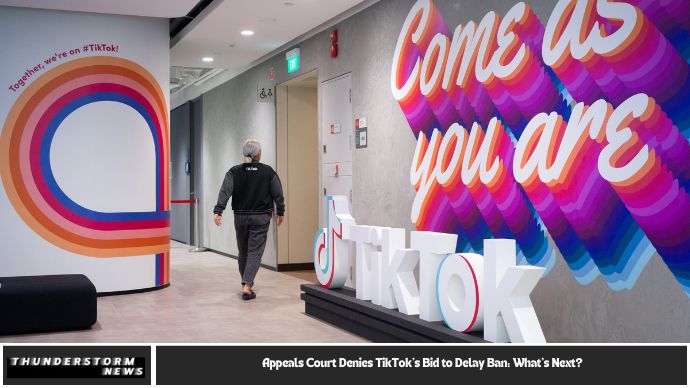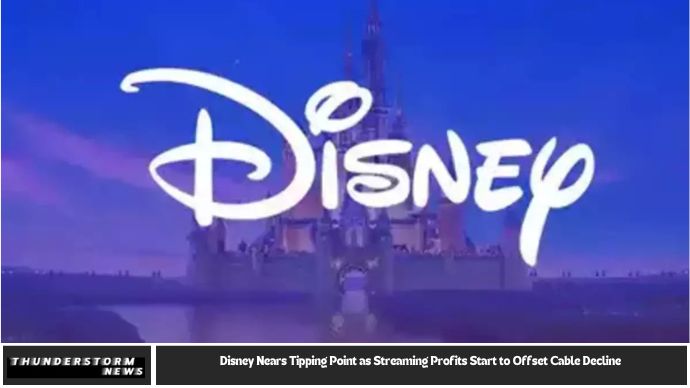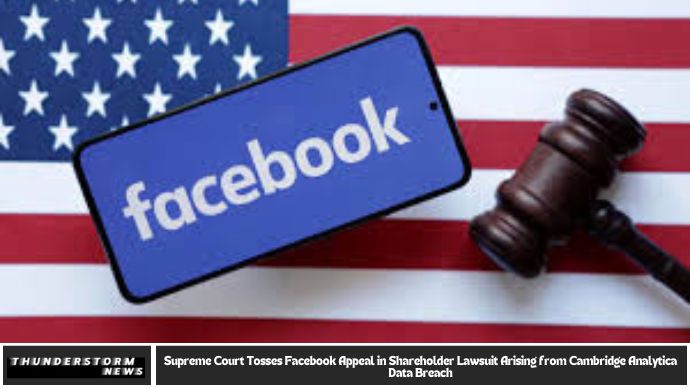In a significant legal development, an appeals court has denied TikTok’s bid to delay a potential ban in the United States. This ruling has sent shockwaves through the social media giant’s millions of users, as it raises questions about the future of the platform and its ability to operate in one of its largest markets. TikTok, known for its viral videos and powerful algorithm, has faced mounting pressure from the U.S. government due to national security concerns, leading to an ongoing legal battle. But with the appeals court’s decision to uphold the ban, TikTok is left scrambling for alternatives to keep its U.S. presence intact.
This decision highlights the tension between government regulations, national security concerns, and the digital freedom of users. As we delve deeper into this case, we will explore what led to this ruling, the potential impact on TikTok users, and what the future may hold for the app.
Background of TikTok’s Legal Challenges
TikTok, a social media platform owned by the Chinese company ByteDance, has faced increasing scrutiny from governments around the world, particularly in the United States. The primary concern centers around the app’s handling of user data, which critics argue could be accessed by the Chinese government, posing a threat to national security. This fear was further fueled by concerns that the platform could be used for espionage or influence operations, despite TikTok’s consistent denials.
Over the past few years, U.S. lawmakers have pushed for TikTok to be banned, citing these security risks. Several legal battles have ensued, with the U.S. government attempting to enforce restrictions on the app or force ByteDance to sell its U.S. operations. In response, TikTok has contested these moves, arguing that such actions would harm its business and infringe upon users’ freedom of expression.
The latest episode in this saga occurred when TikTok sought to delay a ban by filing an appeal, hoping for more time to negotiate or present further evidence. However, the appeals court’s decision to deny TikTok’s request for a delay signals a shift in the legal landscape and adds fuel to the fire of this ongoing controversy.
What Does the Appeals Court Decision Mean for TikTok?
The court’s ruling marks a pivotal moment for the app’s future in the United States. The decision essentially prevents TikTok from continuing its operations without facing the threat of a ban, which could have serious implications for its millions of American users and content creators.
- Impact on Users: A ban could lead to widespread disruption for users who rely on TikTok for entertainment, social interaction, and even income. Many influencers and businesses have built substantial followings and revenue streams on the platform, and a ban would force them to find alternative ways to engage their audiences.
- Business Operations: For TikTok, this ruling adds another layer of uncertainty. The company has already invested significant resources into its U.S. operations, and a ban could force it to scale back its presence or even shut down entirely in the country. Moreover, the potential loss of the U.S. market would be a major blow to TikTok’s global ambitions, as it would lose access to one of its largest user bases.
- Global Impact: The U.S. is not the only country grappling with the issue of TikTok’s data privacy and security risks. Countries such as India and several members of the European Union have also raised concerns about the app. As other governments consider similar actions, TikTok’s ability to operate internationally may come under increasing scrutiny.
The Broader Implications for Social Media and Data Privacy
The case also raises important questions about the role of social media platforms in the digital age and the balance between national security and user rights. As governments become more concerned about data privacy and foreign influence, we are likely to see more regulatory action targeting not just TikTok but other platforms as well.
Social media companies, which rely on massive data collection to fuel their advertising models, must now navigate an increasingly complex legal environment. The issue of user data security is no longer just a concern for companies but has become a central issue in global geopolitics.
For users, this may mean a loss of access to popular platforms or changes in the way their data is used. The ruling could set a precedent for other social media platforms, especially those with international ties, to face similar scrutiny and potential regulation in the future.
TikTok’s Potential Next Steps: What Happens Now?
While the appeals court decision is a setback, it does not necessarily mean the end of TikTok in the United States. The company still has legal avenues to pursue. TikTok may seek to appeal the decision further or attempt to negotiate with U.S. officials in a bid to secure a resolution that allows it to continue operating.
Moreover, TikTok has taken steps in the past to address data privacy concerns, including the establishment of “transparency centers” and promises to store U.S. user data within the country. Whether these measures will be sufficient to satisfy the U.S. government remains to be seen.
TikTok could also explore alternative strategies, such as shifting its focus to other markets, where regulatory scrutiny may be less stringent. The platform has grown rapidly in regions such as Europe, the Middle East, and Southeast Asia, and a potential loss of the U.S. market may accelerate its push into these areas.
Potential Alternatives and Competitors to TikTok
If the ban is upheld and TikTok is forced to shut down its U.S. operations, users may look for alternatives. Several competitors have emerged in recent years, trying to capitalize on TikTok’s success.
- Instagram Reels: Instagram has responded to TikTok’s popularity by introducing Reels, a feature that allows users to create short-form video content similar to TikTok. Although Reels has yet to match TikTok’s level of engagement, it remains a strong contender in the short-video space.
- YouTube Shorts: YouTube also entered the short-form video market with Shorts, targeting TikTok’s user base with its extensive creator ecosystem and established infrastructure.
- Snapchat Spotlight: Snapchat, once the leader in ephemeral content, has introduced Spotlight, a platform for user-generated short-form videos that could serve as another alternative to TikTok.
These competitors are well-positioned to absorb TikTok’s user base, should a ban occur. However, TikTok’s unique algorithm and features, along with its viral culture, are difficult to replicate. It remains to be seen whether these platforms can fully replace the TikTok experience for users.
May you also like it:
London Weather: Thunderstorm Alert for Capital Extended as Heavy Rain Sweeps…
Broomfield Students Pile Up Donations for Their Flooded Peers
5 Blockbusters, 2 Hits, 39 Flops! Was 2022 the Worst Year…
FAQ
1. Why did the appeals court deny TikTok’s request to delay the ban?
The appeals court denied TikTok’s request due to ongoing concerns over national security, particularly regarding the app’s data privacy practices and its potential connection to the Chinese government.
2. How will this ruling affect TikTok users?
If the ban is upheld, millions of U.S. TikTok users may lose access to the app, disrupting content creation, social interactions, and businesses reliant on the platform.
3. Can TikTok appeal this decision further?
Yes, TikTok still has legal options to appeal the decision or negotiate with U.S. authorities, but time is running out for the company to resolve the issue.
4. What are the global implications of this decision?
This ruling may influence other countries to take similar actions against TikTok, especially regarding concerns over data privacy and national security.
5. What alternatives exist for TikTok users?
Alternatives such as Instagram Reels, YouTube Shorts, and Snapchat Spotlight could attract former TikTok users seeking similar short-form video experiences.
6. How can TikTok resolve these legal challenges?
TikTok could negotiate with U.S. regulators, address privacy concerns, or explore new markets to overcome the challenges posed by the ban.
Conclusion
The recent decision by the appeals court to deny TikTok’s bid to delay a ban underscores the legal and political hurdles the platform continues to face in the United States. As TikTok’s legal team contemplates their next steps, the future of the app in the U.S. hangs in the balance. Regardless of the outcome, the case has set an important precedent for how governments around the world may regulate social media and data privacy in the years to come. For now, TikTok users will be left in limbo, wondering whether their favorite app will continue to thrive or face an uncertain future.







